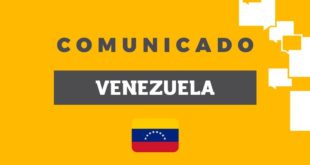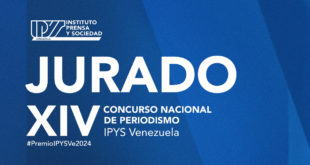El 6 de febrero de 2013, la cuenta anónima de Twitter @Ntreintaytres amedrentó y divulgó fotografías de 4 periodistas de medios impresos que cubren la fuente parlamentaria. Maríaeugenia Morales, reportera de El Nacional; Marisela Castillo, reportera de Tal Cual; Ingrid Bravo Balabú, reportera de Últimas Noticias, y Janet Yucra, corresponsal en Caracas del diario regional Notitarde, fueron víctimas de mensajes intimidatorios difundidos por una cuenta de Twitter, perteneciente a un autodenominado hacker venezolano, quien las acusó de de mantener una campaña de conspiración en la Asamblea Nacional, máximo órgano del poder legislativo.
Uno de los mensajes difundidos por @Ntreintaytres, además de mostrar los rostros de las periodistas, decía: “Financiadas por PJ (Primero Justicia, partido político de oposición) anti chavistas se escudan en su posición de periodistas y son operadoras mediáticas”. Los contenidos contra las reporteras fueron borrados luego de tres días de haber sido publicados en la cuenta de Twitter perteneciente al autodenominado hacker, quien presuntamente ha estado involucrado en otros hechos de ataques cibernéticos, amenazas e intimidaciones contra periodistas, medios, activistas sociales y personalidades públicas de Venezuela.
Los señalamientos y la difusión de los retratos de cada una las reporteras se produjeron luego que este grupo de periodistas participaran en una manifestación pacífica en la Asamblea Nacional, el 05 de febrero de 2013, debido a que directivos de esta dependencia legislativa impidieran el acceso de la prensa a la sesión parlamentaria (/alerta?id=3293&y=2013&m=02).
La difusión de estos mensajes descalificativos y las fotografías de las periodistas, además de amedrentar, colocan en vulnerabilidad su labor informativa. De igual manera, este hecho puede generar que terceros promuevan otras acciones que atenten contra la integridad física y limiten el trabajo de las reporteras.
Por su parte, el Colegio Nacional de Periodistas (CNP) rechazó estas acciones de intimidación que “incitan al odio” y exigió al Ministro de Comunicación e Información, Ernesto Villegas, atender y pronunciarse ante este incidente. El CNP recordó que solicitó a la junta directiva de la Asamblea Nacional una reunión para abordar las limitaciones arbitrarias de acceso a la prensa a las actividades del palacio legislativo.
Las periodistas afectadas, con la colaboración del CNP, formalizarán la denuncia ante el Ministerio Público.
Etiquetas: ciberagresión, intimidación
__________________________________________________________________
Lea la versión en inglés
Alleged hacker intimidated female parliamentary source reporters
On February 6, 2013, the Twitter anonymous account @Ntreintaytres intimidated and published photos of 4 printed media journalists that cover the parliamentary source. Maríaeugenia Morales, female reporter for El Nacional; Marisela Castillo, female reporter for Tal Cual; Ingrid Bravo Balabú, female reporter for Últimas Noticias and Janet Yucra, correspondent in Caracas of the regional newspaper Notitarde, were the victims of intimidatory messages published in a Twitter account belonging to a self-confessed Venezuelan hacker, who accused them of maintaining a conspiracy campaign at the National assembly, the top instance of the legislative power.
One of the messages broadcast by @Ntreintaytres, apart from showing the faces of the journalists, said: “Financed by PJ (Primero Justicia, opposition political party), anti-chavistas (as the opposers of Chávez are called) are shielding themselves behind their position as journalists and are manipulating the media”. The content against the female reporters were erased three days after being published in the Twitter account belonging to the self-confessed hacker, who has presumably been involved in other cyber-attacks, threats and intimidation against journalists, the media, social activists and public personalities in Venezuela.
The accusations and diffusion of the portraits of each one of the female reporters occurred after this group of journalists participated in a peaceful manifestation at the national assembly on February 5, 2013, because the directors of this legislative office prevented the press from having access to parliamentary sessions (/alerta?id=3293&y=2013&m=02).
The diffusion of these derogatory messages and photos of the journalists, apart from intimidating, make them vulnerable in their work of informing. This could also generate third parties promoting other actions attempting against the physical integrity and limit the job of the female reporters.
The National College of Journalists (CNP for its acronyms in Spanish) rejected these intimidation actions that “incite hatred” and demanded that the minister of communications and information, Ernesto Villegas, to attend to and make a statement regarding this incident. The CNP recalled that it requested a meeting with the board of directors of the national assembly to broach the arbitrary limitations hindering access to the press to the activities in the legislative palace.
With the collaboration of the CNP, the affected journalists shall make a formal complaint to the justice department.
Labels: cyber-assault, intimidation
 IPYS Instituto Prensa y Sociedad Venezuela
IPYS Instituto Prensa y Sociedad Venezuela



